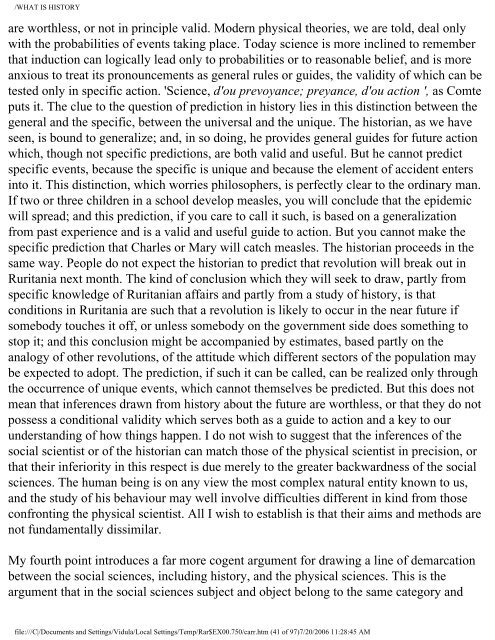What is History / by Edward Hallett Carr - Universal History Library
What is History / by Edward Hallett Carr - Universal History Library
What is History / by Edward Hallett Carr - Universal History Library
You also want an ePaper? Increase the reach of your titles
YUMPU automatically turns print PDFs into web optimized ePapers that Google loves.
WHAT IS HISTORY<br />
are worthless, or not in principle valid. Modern physical theories, we are told, deal only<br />
with the probabilities of events taking place. Today science <strong>is</strong> more inclined to remember<br />
that induction can logically lead only to probabilities or to reasonable belief, and <strong>is</strong> more<br />
anxious to treat its pronouncements as general rules or guides, the validity of which can be<br />
tested only in specific action. 'Science, d'ou prevoyance; preyance, d'ou action ', as Comte<br />
puts it. The clue to the question of prediction in h<strong>is</strong>tory lies in th<strong>is</strong> d<strong>is</strong>tinction between the<br />
general and the specific, between the universal and the unique. The h<strong>is</strong>torian, as we have<br />
seen, <strong>is</strong> bound to generalize; and, in so doing, he provides general guides for future action<br />
which, though not specific predictions, are both valid and useful. But he cannot predict<br />
specific events, because the specific <strong>is</strong> unique and because the element of accident enters<br />
into it. Th<strong>is</strong> d<strong>is</strong>tinction, which worries philosophers, <strong>is</strong> perfectly clear to the ordinary man.<br />
If two or three children in a school develop measles, you will conclude that the epidemic<br />
will spread; and th<strong>is</strong> prediction, if you care to call it such, <strong>is</strong> based on a generalization<br />
from past experience and <strong>is</strong> a valid and useful guide to action. But you cannot make the<br />
specific prediction that Charles or Mary will catch measles. The h<strong>is</strong>torian proceeds in the<br />
same way. People do not expect the h<strong>is</strong>torian to predict that revolution will break out in<br />
Ruritania next month. The kind of conclusion which they will seek to draw, partly from<br />
specific knowledge of Ruritanian affairs and partly from a study of h<strong>is</strong>tory, <strong>is</strong> that<br />
conditions in Ruritania are such that a revolution <strong>is</strong> likely to occur in the near future if<br />
somebody touches it off, or unless somebody on the government side does something to<br />
stop it; and th<strong>is</strong> conclusion might be accompanied <strong>by</strong> estimates, based partly on the<br />
analogy of other revolutions, of the attitude which different sectors of the population may<br />
be expected to adopt. The prediction, if such it can be called, can be realized only through<br />
the occurrence of unique events, which cannot themselves be predicted. But th<strong>is</strong> does not<br />
mean that inferences drawn from h<strong>is</strong>tory about the future are worthless, or that they do not<br />
possess a conditional validity which serves both as a guide to action and a key to our<br />
understanding of how things happen. I do not w<strong>is</strong>h to suggest that the inferences of the<br />
social scient<strong>is</strong>t or of the h<strong>is</strong>torian can match those of the physical scient<strong>is</strong>t in prec<strong>is</strong>ion, or<br />
that their inferiority in th<strong>is</strong> respect <strong>is</strong> due merely to the greater backwardness of the social<br />
sciences. The human being <strong>is</strong> on any view the most complex natural entity known to us,<br />
and the study of h<strong>is</strong> behaviour may well involve difficulties different in kind from those<br />
confronting the physical scient<strong>is</strong>t. All I w<strong>is</strong>h to establ<strong>is</strong>h <strong>is</strong> that their aims and methods are<br />
not fundamentally d<strong>is</strong>similar.<br />
My fourth point introduces a far more cogent argument for drawing a line of demarcation<br />
between the social sciences, including h<strong>is</strong>tory, and the physical sciences. Th<strong>is</strong> <strong>is</strong> the<br />
argument that in the social sciences subject and object belong to the same category and<br />
file:///C|/Documents and Settings/Vidula/Local Settings/Temp/Rar$EX00.750/carr.htm (41 of 97)7/20/2006 11:28:45 AM







